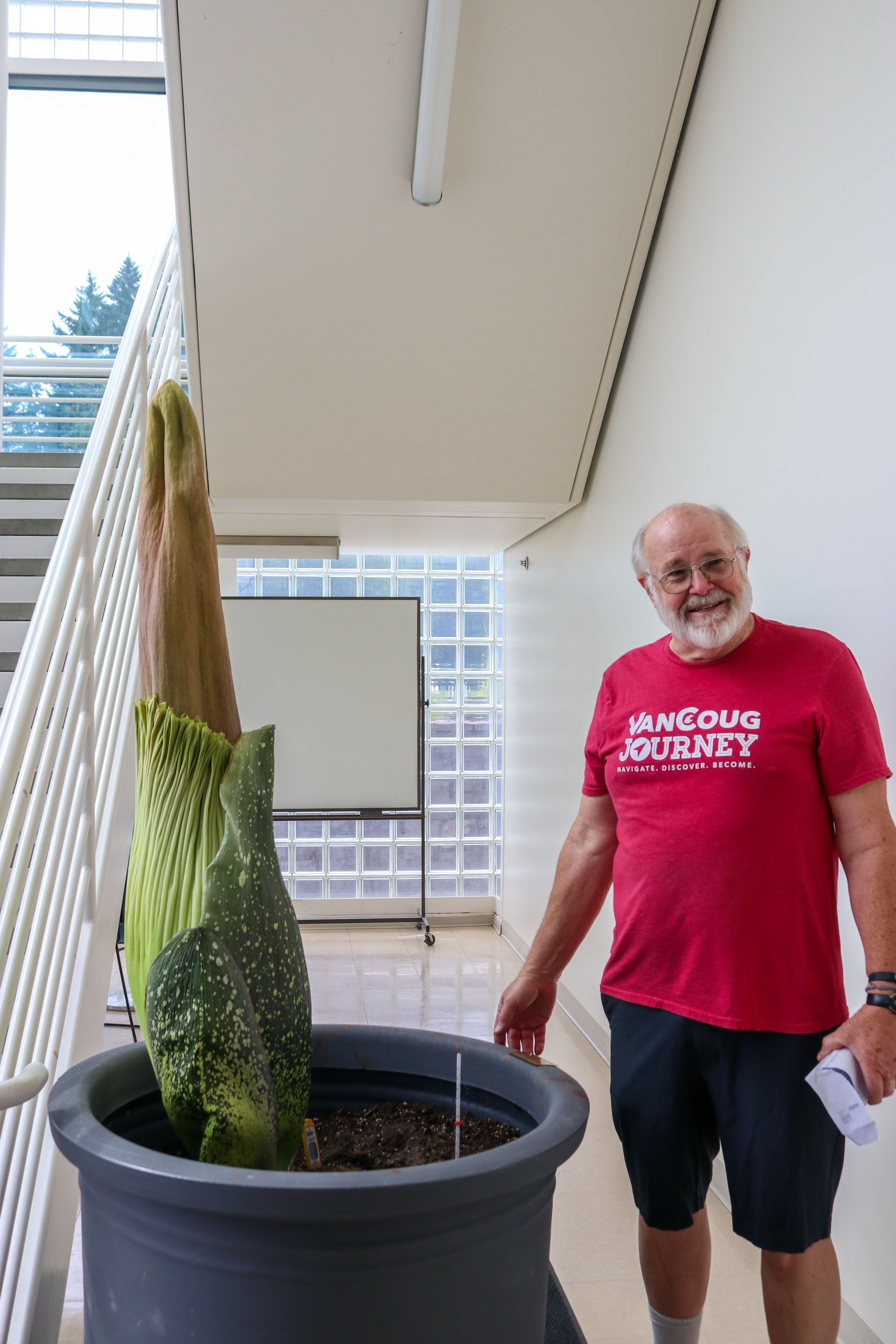Both a sight and smell to behold, Titan VanCoug, WSU Vancouver’s corpse flower, drew crowds to campus on Aug. 17 when it bloomed for a second time, three years after its last foul-smelling flowering event.
“I mean it’s just amazing that WSU Vancouver, right here in Salmon Creek, Washington, has this amazing threatened species that we can share with everyone.” – Brenda Alling
In 2019, Titan, whose genus name is “Amorphophallus titanum,” bloomed for the first time ever and was not expected to show its petals again anytime soon. According to Steve Sylvester, a retired WSU Vancouver professor who planted and raised Titan from a seedling 20 years ago, corpse flowers are notoriously difficult to care for.
For over two decades, Titan has lived in the WSU Vancouver Science and Engineering Building stairwell, far from its native home of Sumatra, Indonesia. A corpse flowers’ ideal conditions include a temperature of 80 degrees Fahrenheit and a humidity of 80%, far warmer than its current residence on campus. On top of less than favorable environmental conditions, outside interference has also threatened Titan’s life.
“Somebody decided I wasn’t watering enough because it was yellowing, and so they over-watered it and I came in the next day and there was sap all over the wall, the stem had exploded and fell over. So I cut it off,” Sylvester said.
Instructional classroom support technician, Dawn Freeman, has been overseeing Titan’s care since Sylvester retired and has come to love the flower’s many quirks and curiosities.
“It doesn’t bloom very often, it takes a lot of time, it’s ridiculously large and fun. It’s beautiful to look at the frilly spathe, pretty colors and interesting smell. Maybe that’s not everybody’s favorite, but I find it interesting,” Freeman said. “The fact that it doesn’t belong here and we can make it grow anyway. It’s really neat to have a piece of somewhere else and be able to love it and care for it, to give it a nice home.”
The species’ morbid name derives from the smell the plant produces during its 24 to 36 hour bloom. Mark Owens, instructional classroom support technician, has assisted in Titan’s care and said the purpose of its smell is to attract pollinators — such as dung beetles and flesh flies — that feed on decaying animals.
“If you’ve ever been out in the woods and you’ve stumbled across an animal that has died and is rotting, that flower got the aroma spot on,” Owens said.
Titan’s bloom in 2019 brought an estimated 19,000 to 20,000 spectators to the WSU Vancouver campus, according to Sylvester. Reporters and community members waited in lines upwards of three hours long to get a glimpse — and a whiff — of this rare flowering event.
Coroners even flocked to campus three years ago to evaluate the flower’s smell as compared to rotting corpses. Ultimately, Titan brings people together, Owens said.
Brenda Alling, Titan’s self-proclaimed “personal publicist” and director of marketing and communications at WSU Vancouver, said Titan’s bloom generated wide-reaching media coverage for the university.
“Bringing that number of people to campus and getting the kind of media attention that puts WSU Vancouver on the map is very fulfilling from a career point of view. We could not afford the kind of coverage and media time that we got on the first bloom or that we’re getting now,” Alling said.
For Sylvester, the initial turnout was exactly the response he was hoping for when he planted the seed 17 years earlier.
“At one time I asked the crowd around, ‘for how many of you, this is your first time on our campus?’ 80% of people raised their hand. I liked the idea that people didn’t know that we are a research university, that we are successful in placing students in all kinds of jobs and professions,” Sylvester said.
It was difficult to anticipate when Titan would bloom — based on the flower’s track record in previous years — and the plant opened earlier than Sylvester had expected. During this most recent bloom, the Titan team, composed of public safety, administrators, alumni development relations and many more, prepared for the plant to open at any time, Freeman said.
“It’s really neat to have a piece of somewhere else and be able to love it and care for it, to give it a nice home.” – Dawn Freeman
During Titan’s blooming period, signs were posted around campus to guide visitors, and experts were set up to answer questions about the plant.
“This time, I feel like I’m preparing for a premature baby, just in case. There’s a reason that you never have a baby shower on the day the baby’s born. Because I’m throwing a party for I don’t know how many guests, on I don’t know what day … it’s the worst possible way to plan an event,” Alling said.
This year, Titan did not fully open, which Sylvester attributes to potential heat stress. Titan, nonetheless, attracted large numbers of staff, faculty, students and community members for its short-lived display. For future blooms, Titan’s care staff will continue to educate the public on the plant and bring awareness to the deforestation in Sumatra, leading to the extinction of corpse flowers.
“We have a very rare threatened species of plant on our campus. I sort of consider Titan our ‘unofficial mascot.’ I mean it’s just amazing that WSU Vancouver, right here in Salmon Creek, Washington, has this amazing threatened species that we can share with everyone,” Alling said.

Bethanie is a senior studying environmental and ecosystem science at WSU Vancouver.
